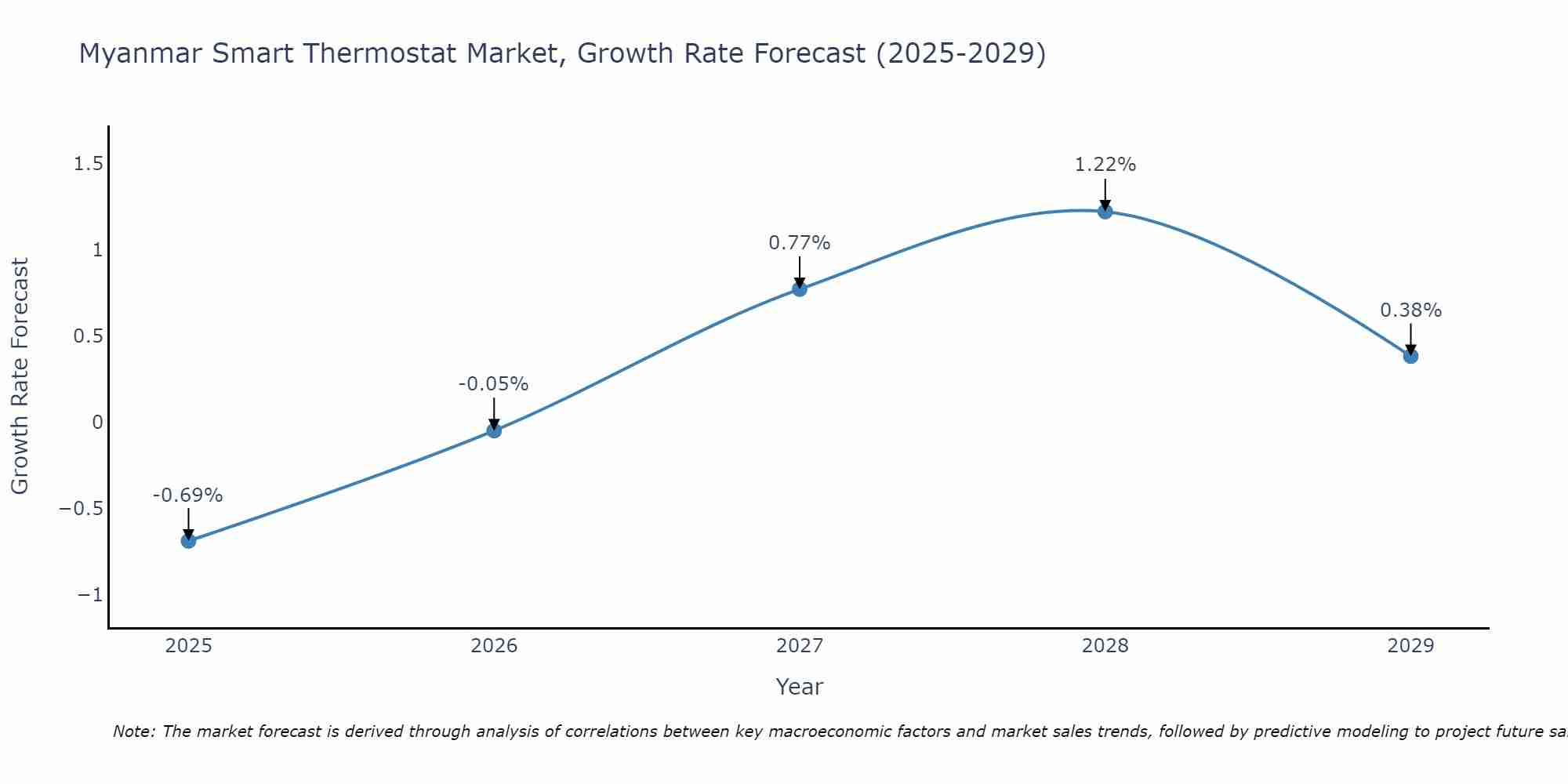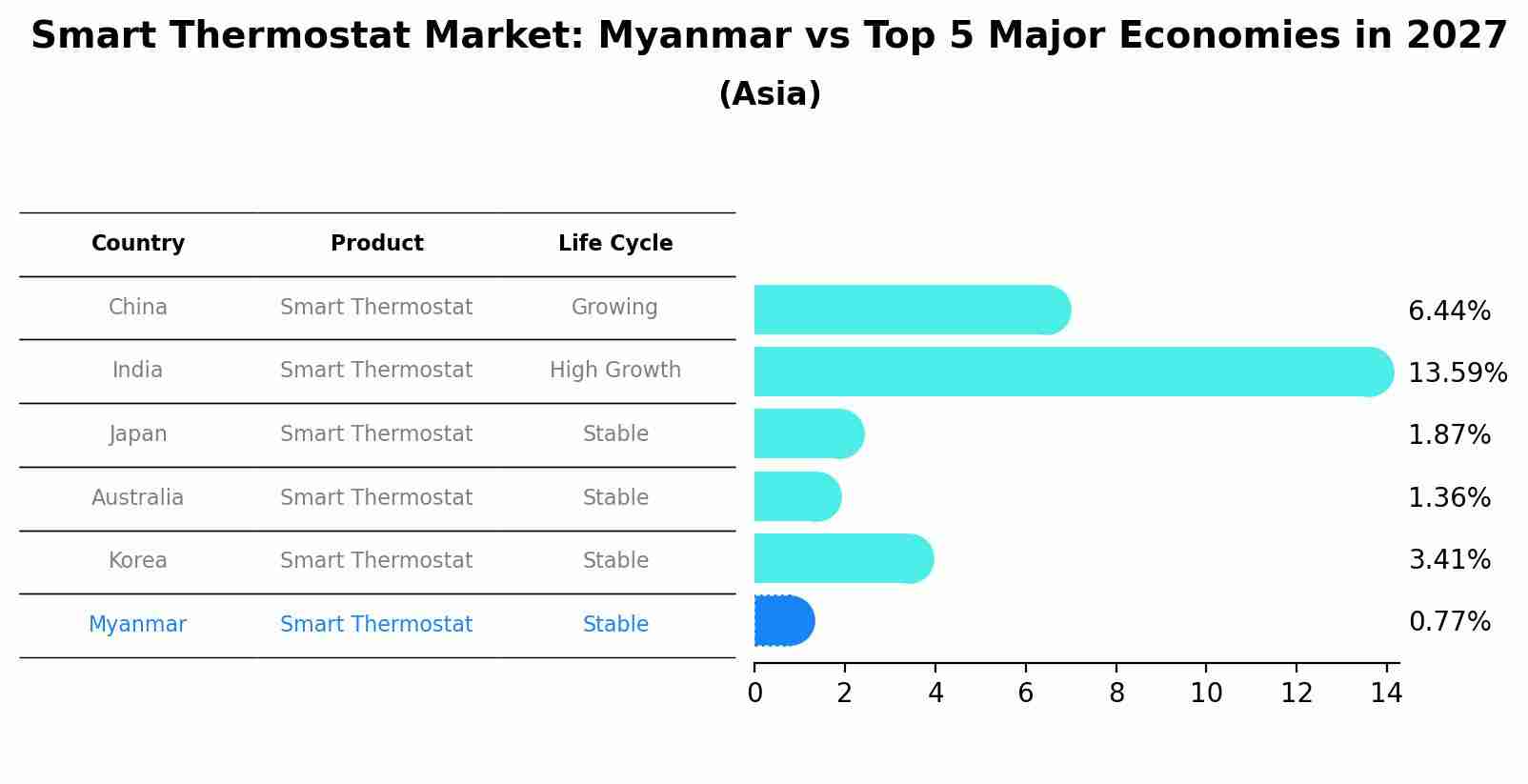Myanmar Smart Thermostat Market (2025-2031) Outlook | Trends, Share, Industry, Growth, Forecast, Revenue, Companies, Size, Analysis & Value
| Product Code: ETC369514 | Publication Date: Aug 2022 | Updated Date: Jul 2025 | Product Type: Market Research Report | |
| Publisher: 6Wresearch | Author: Ravi Bhandari | No. of Pages: 75 | No. of Figures: 35 | No. of Tables: 20 |
Myanmar Smart Thermostat Market Size Growth Rate
The Myanmar Smart Thermostat Market is projected to witness mixed growth rate patterns during 2025 to 2029. Starting at -0.69% in 2025, the market peaks at 1.22% in 2028, and settles at 0.38% by 2029.

Smart Thermostat Market: Myanmar vs Top 5 Major Economies in 2027 (Asia)
The Smart Thermostat market in Myanmar is projected to grow at a stable growth rate of 0.77% by 2027, within the Asia region led by China, along with other countries like India, Japan, Australia and South Korea, collectively shaping a dynamic and evolving market environment driven by innovation and increasing adoption of emerging technologies.

Myanmar Smart Thermostat Market Synopsis
The Myanmar smart thermostat market is witnessing steady growth due to increasing awareness of energy efficiency and the adoption of smart home technologies. Factors such as rising disposable income, urbanization, and government initiatives to promote energy-saving solutions are driving market expansion. Consumers are increasingly seeking smart thermostats for their ability to optimize energy consumption, enhance convenience through remote control features, and provide cost savings in the long run. Key players in the market are focusing on product innovation, such as integration with AI and voice control technology, to stay competitive. However, challenges like limited internet connectivity and infrastructure development may hinder market growth. Overall, the Myanmar smart thermostat market presents opportunities for both local and international manufacturers to capitalize on the growing demand for smart home solutions.
Myanmar Smart Thermostat Market Trends
The Myanmar Smart Thermostat Market is experiencing a growing demand due to the increasing awareness of energy efficiency and smart home technologies among consumers. Key trends in the market include the integration of smart thermostats with home automation systems for increased convenience and energy savings, the development of advanced features such as learning algorithms and remote access via smartphone apps, and the emphasis on sustainability and environmental impact. Additionally, the market is seeing a rise in partnerships between smart thermostat manufacturers and energy companies to promote energy conservation initiatives. With the Myanmar government`s focus on promoting sustainable development, the smart thermostat market is expected to continue its growth trajectory in the coming years.
Myanmar Smart Thermostat Market Challenges
In the Myanmar Smart Thermostat Market, several challenges are faced, including limited awareness and understanding of smart thermostat technology among consumers, inadequate infrastructure for widespread adoption, affordability issues due to the relatively higher cost of smart thermostats compared to traditional ones, and the lack of regulatory frameworks to support the growth of the market. Additionally, the unstable political environment and economic uncertainties in Myanmar pose further challenges for companies operating in the smart thermostat sector. Overcoming these obstacles will require targeted education and marketing efforts to increase consumer awareness, investment in infrastructure development, and collaboration between industry stakeholders and government bodies to address regulatory gaps and create a conducive environment for market growth.
Myanmar Smart Thermostat Market Investment Opportunities
The Myanmar Smart Thermostat Market presents promising investment opportunities due to the increasing demand for energy-efficient solutions in the country. With the growing awareness of climate change and the need for sustainable living practices, the adoption of smart thermostats is expected to rise. Investors can capitalize on this trend by entering the market with innovative and cost-effective smart thermostat solutions tailored to the specific needs of Myanmar consumers. Additionally, partnerships with local distributors and technology companies can help in establishing a strong presence in the market. As the country continues to develop and modernize, investing in the Myanmar Smart Thermostat Market can offer long-term growth potential and a competitive advantage in the region.
Jordan Agar Market Government Policies
Government policies related to the Myanmar Smart Thermostat Market are aimed at promoting energy efficiency and sustainability in buildings. The government has introduced initiatives such as tax incentives and rebates for households and businesses that install smart thermostats to reduce energy consumption and greenhouse gas emissions. Additionally, there are regulations in place to encourage the adoption of smart building technologies, including smart thermostats, in new construction projects to meet energy efficiency standards. The government also works closely with industry stakeholders to develop technical standards and guidelines for the deployment of smart thermostats to ensure interoperability and data security. Overall, government policies in Myanmar are focused on driving the growth of the smart thermostat market as part of broader efforts to mitigate climate change and enhance energy efficiency in buildings.
Myanmar Smart Thermostat Market Future Outlook
The future outlook for the Myanmar Smart Thermostat Market looks promising as the country experiences rapid urbanization and increasing adoption of smart technologies. With a growing awareness of energy efficiency and sustainability, there is a rising demand for smart home devices such as thermostats that can help consumers save on energy costs. Additionally, the increasing availability of affordable internet connectivity and the proliferation of smart home ecosystems are further driving the adoption of smart thermostats in Myanmar. As the market continues to evolve, we can expect to see more innovative features and functionalities being introduced by both local and international manufacturers to cater to the diverse needs of Myanmar consumers, making the smart thermostat market a lucrative opportunity for businesses in the coming years.
Key Highlights of the Report:
- Myanmar Smart Thermostat Market Outlook
- Market Size of Myanmar Smart Thermostat Market, 2024
- Forecast of Myanmar Smart Thermostat Market, 2031
- Historical Data and Forecast of Myanmar Smart Thermostat Revenues & Volume for the Period 2021 - 2031
- Myanmar Smart Thermostat Market Trend Evolution
- Myanmar Smart Thermostat Market Drivers and Challenges
- Myanmar Smart Thermostat Price Trends
- Myanmar Smart Thermostat Porter's Five Forces
- Myanmar Smart Thermostat Industry Life Cycle
- Historical Data and Forecast of Myanmar Smart Thermostat Market Revenues & Volume By Type for the Period 2021 - 2031
- Historical Data and Forecast of Myanmar Smart Thermostat Market Revenues & Volume By Wireless for the Period 2021 - 2031
- Historical Data and Forecast of Myanmar Smart Thermostat Market Revenues & Volume By Wireless for the Period 2021 - 2031
- Historical Data and Forecast of Myanmar Smart Thermostat Market Revenues & Volume By End-User Vertical for the Period 2021 - 2031
- Historical Data and Forecast of Myanmar Smart Thermostat Market Revenues & Volume By Residential for the Period 2021 - 2031
- Historical Data and Forecast of Myanmar Smart Thermostat Market Revenues & Volume By Commercial for the Period 2021 - 2031
- Myanmar Smart Thermostat Import Export Trade Statistics
- Market Opportunity Assessment By Type
- Market Opportunity Assessment By End-User Vertical
- Myanmar Smart Thermostat Top Companies Market Share
- Myanmar Smart Thermostat Competitive Benchmarking By Technical and Operational Parameters
- Myanmar Smart Thermostat Company Profiles
- Myanmar Smart Thermostat Key Strategic Recommendations
Frequently Asked Questions About the Market Study (FAQs):
- Single User License$ 1,995
- Department License$ 2,400
- Site License$ 3,120
- Global License$ 3,795
Search
Thought Leadership and Analyst Meet
Our Clients
Related Reports
- Canada Oil and Gas Market (2026-2032) | Share, Segmentation, Value, Industry, Trends, Forecast, Analysis, Size & Revenue, Growth, Competitive Landscape, Outlook, Companies
- Germany Breakfast Food Market (2026-2032) | Industry, Share, Growth, Size, Companies, Value, Analysis, Revenue, Trends, Forecast & Outlook
- Australia Briquette Market (2025-2031) | Growth, Size, Revenue, Forecast, Analysis, Trends, Value, Share, Industry & Companies
- Vietnam System Integrator Market (2025-2031) | Size, Companies, Analysis, Industry, Value, Forecast, Growth, Trends, Revenue & Share
- ASEAN and Thailand Brain Health Supplements Market (2025-2031) | Strategy, Consumer Insights, Analysis, Investment Trends, Opportunities, Growth, Size, Share, Industry, Revenue, Segments, Value, Segmentation, Supply, Forecast, Restraints, Outlook, Competition, Drivers, Trends, Demand, Pricing Analysis, Competitive, Strategic Insights, Companies, Challenges
- ASEAN Bearings Market (2025-2031) | Strategy, Consumer Insights, Analysis, Investment Trends, Opportunities, Growth, Size, Share, Industry, Revenue, Segments, Value, Segmentation, Supply, Forecast, Restraints, Outlook, Competition, Drivers, Trends, Demand, Pricing Analysis, Competitive, Strategic Insights, Companies, Challenges
- Europe Flooring Market (2025-2031) | Outlook, Share, Industry, Trends, Forecast, Companies, Revenue, Size, Analysis, Growth & Value
- Saudi Arabia Manlift Market (2025-2031) | Outlook, Size, Growth, Trends, Companies, Industry, Revenue, Value, Share, Forecast & Analysis
- Uganda Excavator, Crane, and Wheel Loaders Market (2025-2031) | Strategy, Consumer Insights, Analysis, Investment Trends, Opportunities, Growth, Size, Share, Industry, Revenue, Segments, Value, Segmentation, Supply, Forecast, Restraints, Outlook, Competition, Drivers, Trends, Demand, Pricing Analysis, Competitive, Strategic Insights, Companies, Challenges
- Rwanda Excavator, Crane, and Wheel Loaders Market (2025-2031) | Strategy, Consumer Insights, Analysis, Investment Trends, Opportunities, Growth, Size, Share, Industry, Revenue, Segments, Value, Segmentation, Supply, Forecast, Restraints, Outlook, Competition, Drivers, Trends, Demand, Pricing Analysis, Competitive, Strategic Insights, Companies, Challenges
Industry Events and Analyst Meet
Whitepaper
- Middle East & Africa Commercial Security Market Click here to view more.
- Middle East & Africa Fire Safety Systems & Equipment Market Click here to view more.
- GCC Drone Market Click here to view more.
- Middle East Lighting Fixture Market Click here to view more.
- GCC Physical & Perimeter Security Market Click here to view more.
6WResearch In News
- Doha a strategic location for EV manufacturing hub: IPA Qatar
- Demand for luxury TVs surging in the GCC, says Samsung
- Empowering Growth: The Thriving Journey of Bangladesh’s Cable Industry
- Demand for luxury TVs surging in the GCC, says Samsung
- Video call with a traditional healer? Once unthinkable, it’s now common in South Africa
- Intelligent Buildings To Smooth GCC’s Path To Net Zero


















